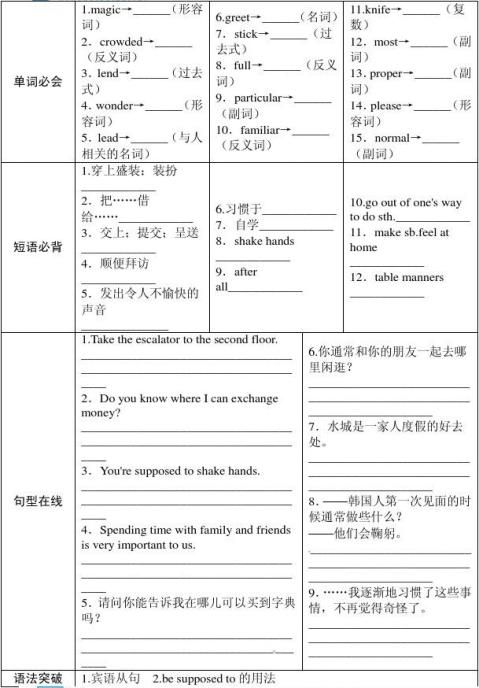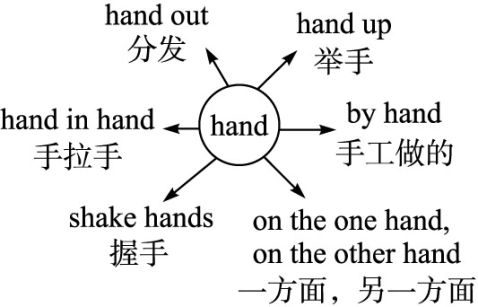20xx年春九年级英语教学安排
20xx年春九年级英语教学安排
迎接好中考成为本学期教学的一个重要工作。因此,教师在教学中应该帮助学生理解、吸收、吃透教材,对教材中的知识进行内化,即进行综合、应用、创新和中考思维的升华,把书本知识变成学生自己的知识。同时还得加强对听力和阅读能力的培养和指导,使学生在这方面的能力有所提高,为今年的中考奠定基础。
一、教材分析
初中英语共五册,我们争取在四月中旬完成第一轮复习,边复习、边归纳、边练习,复习一册就测试一次。在检测学生学习中存在的问题的同时,及时向学生反馈遗漏、模糊、条理不清的知识,使学生在最短的时间内对学过的知识有一套系统的、完整的体系。五月底前完成专项复习;六月份做模拟套卷,迎接中考。
二、教学措施
根据学生的情况和班上的实际,本学期采用以下措施:
(1)首先要从思想上扭转学生以往的不良学习习惯和态度,培养学生自觉的学习习惯,动脑的优良习惯,课堂上精讲多练。即将面临的是中考,学生的态度变化多变极不稳定,要动员好学生做好思想工作。
(2)根据学生个人的具体情况,要求各自提出明确的学习目标,具体的分数,每次考试都要写总结并制定下一次的目标,建立错题本。
(3)每堂课教师一定注意当堂的学习效果,突出重点难点.务必要求学生掌握必须掌握的基本的东西.注意检查学生做笔记的情况。
(4)重视创设英语学习的环境,沟通课本内外、课堂内外、学校内外的联系,拓宽学习渠道,增加学生应用的机会。作文教学与阅读教学相结合,在写作中学阅读,阅读中学写作。积累经典名言名句等。
(5)作业要天天有,作业上问题比较突出的要提出来讲解分析。
(6)利用课外时间进行培优补差。把学生分成两类,中上提高括充知识点,中后有一定潜力的,以抓好基础知识为重。缩小两极差异兼顾整体共同进步。
(7)在复习过程中增加听力和阅读以及书面表达的训练。
三、教学进度安排
第一周第二周复习七年级上下册;
第三周到第五周复习八年级上下册;
第六周到第八周复习九年级全一册;
第九周到第十二周进行专项复习如名词、代词、数词、冠词、形容词副词、动词、句子结构、复合句、交际用语、听力;
第十三周进行仿真模拟训练,还要精讲多练,针对常考易错的再总结复习; 最后做好考前动员。
第二篇:20xx年九年级英语总复习
九年级(全一册)
第19课时 Units 11-

12


1.Could you please tell me where I can get a dictionary?
请问你能告诉我在哪儿可以买到字典吗?
【考点】(1)Could you please do sth.?“你可以做某事吗?”,是表示有礼貌请求的交际用语。
—Could you please put away your shoes?
你可以把你的鞋子收起来吗?
—Sorry,I will do it right away.对不起。我马上做。
(2)where在这里引导宾语从句,宾语从句用陈述语序。
Can you tell me where I can find Tom?
你能告诉我在哪里我能找到汤姆吗?
【演练】—Could you please tell me______?
—They're over there.
A.where are the restrooms
B.where were the restrooms
C.where the restrooms are
2.However,in order not to offend people,learning about language etiquette is just as important as learning grammar or vocabulary.但是,为了不冒犯别人,了解语言上的礼仪就如同学习语法或词汇一样重要。
【考点】in order to“为了??,以便??”,to为不定式符号,后跟动词原形,其否定形式是在to前加not。 I often get up at six in order to catch the bus.
为了赶上公共汽车我经常在六点起床。
You'd better take a map with you in order not to get lost.
为了不迷路,你最好随身带着一张地图。
【拓展】in order that“为了”,相当于so that,引导目的状语从句。 We should work hard in order that we can pass the final exam. 为了能通过期末考试,我们应该努力学习。
【演练】A lot of famous doctors gathered in Harbin ______ save “China's most beautiful teacher”—Ms Zhang Lili.
A.so that B.in order to C.in order that
3.Some students want to hand in their homework later than the teacher asked for it. 一些学生想比老师要求的更晚一些交他们的家庭作业。
【考点】hand in是“动词+副词”构成的短语动词,宾语为代词,放在中间,其反义词组为hand out。
【拓展】与hand相关的常见短语有:

【演练】The teacher got angry and he asked me to______my homework at once.But I left it
at home.
A.hand in B.give out C.put away
4.In your country,what are you supposed to do when you meet someone for the first time?
在你们国家,当你第一次和某人见面时应该做什么?
【考点】be supposed to do sth.表示“应该做??;被期望做??”,是被动语态结构,用来表示劝告、建议、义务等。
You are supposed to come here before 8:00.
你应该八点前来这儿。
【拓展】否定式为be not supposed to do sth.意为“不准做某事;不应该做某事”,表示命令和禁止。
You're not supposed to talk loudly in class.
在课堂上不准大声交谈。
【演练】Students are ______ to speak loudly in the reading room.
A.told B.not supposed C.allowed
5.You shouldn't point at anyone with your chopsticks.
你不应该用筷子指着人。
【考点】point at“指着”。
It's impolite of you to point at me.
你指着我是不礼貌的。


A.pointing B.pointing to C.pointing out
Ⅰ.单项填空
1.—______ do the dishes after dinner,Mike?
—Yes,sure.
A.Would you like B.Would you mind C.Could you please
2.—Excuse me,can I ______ your pen?
—Sorry,I have ______ it to Julie.
A.lend;borrow B.borrow;lend C.borrow;lent
3.—I'm afraid I can't remember______.
—In Chouzhou Park,I think.
A.where did I first meet you
B.when I first met you
C.where I first met you
4.Customers are not supposed ______ here.
A.to smoke B.smoking C.smoke
5.The room ______ people.
A.is fill of B.is full of C.fill with
6.The staff in the supermarket ______ Father Christmas to welcome the customers on Christmas Day.
A.are dressed in B.are dressed up C.dress up as
7.I sometimes______ my friend's house on weekends.
A.drop by B.put off C.make up
8.—Jim,would you please tidy up your room by yourself?______,you are no longer a child.
—All right,I'm coming.
A.First of all B.After all C.As a result
9.Don't let the children run so fast.He is too young ______.
A.all after B.after all C.above all
10.In order______others,learning about language etiquette is very important.
A.to offend B.not to offend C.not offending
Ⅱ.完形填空
Around the world, people have different ideas about what good manners are.When you go to , you may think there is something wrong with it.However, in many western countries, Paying the bill is also different from country to country.In China, one person usually pays (宴请宾客), share the cost.This is called “going Dutch” (均摊费用).Also,when westerners pay the bill, they usually leave some money for the__8__.This is called “leaving a tip”.10%, 15%, or 20% of the bill, which is decided by how good the service(服务) is.Good waiters can make a lot of money!
The way people eat food is not the same in different parts of the world, but you same kind of food in many countries.Chinese and Indian foods, for example, are popular all over the world.
1.A.popular B.difficult C.important
2.A.cause B.keep C.make
3.A.lively B.friendly C.lucky
4.A.noisy B.quiet C.busy
5.A.shout B.explain C.complain
6.A.everybody B.nobody C.somebody
7.A.until B.when C.unless
8.A.gatekeeper B.seller C.waiter
9.A.terrible B.common C.serious
10.A.invent B.discover C.find
Ⅲ.理解选择
People from other countries will find many different surprising things in Britain.
Greek:A man from Greece sees a special way of driving in Britain.People drive on the left in the British street,but the British people never feel surprised.The Greek man said,“I've been in Britain for nearly a month now.But at first,I couldn't always remember to drive on the left.Every time,my friend reminded me.”
Japanese:Japanese people can't understand why British people keep their shoes on at home.In Japan,people walk in the room without shoes.If a visitor keeps his shoes on at home in Japan,the Japanese people think he is very impolite.
Spanish:The Spanish people mind the way that the British people greet each other.They themselves seem to be afraid of touching(接触).When they meet,they just smile or nod but never kiss or hug(拥抱) in Spain.But the British people think kissing is a very usual greeting when they meet!
There is an old saying,“When in Rome,do as the Romans do.”When we go to a foreign country,we should follow the etiquette of the country.
1.The Greek visitor ______.
A.always drives on the left
B.used to drive on the left
C.drove correctly in Britain with his friend's help
2.______ think it's impolite to wear shoes at home.
A.The Japanese B.The Greek C.The English
3.When greeting,the Spanish ______.
A.kiss each other B.hug each other C.smile at each other
4.______ seem not to be afraid of touching each other.
A.The Spanish B.The British C.The Japanese
5.Etiquette in the world ______.
A.is the same B.is important C.is sometimes different and interesting
参考答案
第19课时 Units 11-12
导学必备知识
词汇拓展
1.magical 2.uncrowded 3.lent 4.wonderful 5.leader 6.greeting 7.stuck
8.empty/hungry 9.particularly 10.unfamiliar 11.knives 12.mostly 13.properly
14.pleased/pleasant 15.normally
短语互译
1.dress up 2.lend...to 3.hand in 4.drop by 5.make (a) noise 6.be/get used to
7.learn...by oneself
8.握手 9.毕竟;终究;究竟 10.特地(不怕麻烦地)做某事
11.使某人感到宾至如归 12.餐桌礼仪
句型再现
1.乘自动扶梯到二楼然后右转。
2.你知道我在哪儿能换钱吗?
3.你们应该握手。
4.花时间陪家人和朋友对我们很重要。
5.Could you please tell me where I can get a dictionary?
6.Where do you usually hang out with your friends?
7.Watertown is a great place for the family to take a vacation.
8.—What are people in Korea supposed to do when they meet for the first time? —They're supposed to bow.
9....I'm gradually getting used to things and don't find them so strange any more. 突破核心考点
1.C 2.B 3.A 4.B 5.B
研习预测试题
Ⅰ.1.C 在所给的三个选项中只有Could you please 跟动词原形; Would you like后跟动词不定式;Would you mind后跟动名词。
2.C 考查borrow和lend的区别。borrow指“借入”;lend指“借出”。第一句是“借入”用borrow;第二句是指“借出”,根据“I have...”判断用lend的过去分词lent。
3.C 由答语可知宾语从句的连接词为where,再由宾语从句用陈述语序可知答案为C项。
4.A be supposed to do sth.“应当做某事”。
5.B be full of=be filled with... “充满……”。
6.C dress up as “打扮成……”。
7.A 句意:我有时候在周末拜访我朋友的家。drop by“顺便拜访”;put off“推迟”;make up“编造”。故选A项。
8.B 句意:——吉姆,你可以自己整理干净你的房间吗?毕竟你不再是一个孩子了。——好的。我这就来。first of all“首先”;after all“毕竟”;as a result“结果是”。
9.B after all “毕竟,终究”。
10.B in order to do sth.“为了做某事”,否定形式为in order not to do sth.。
Ⅱ.1.C 由下文可知,知道正确和错误的事是很重要的。
2.C make a noise“制造噪音”。
3.A lively“热闹的”。
4.B 由转折副词however可知西方国家的饭店和中国饭店的热闹不一样,故选B项。
5.C complain to“向……抱怨”。
6.A 由下文可知在中国吃饭是一个人为大家付费,故选A项。
7.B when“当……时候”,引导时间状语从句。
8.C 由下文可知小费是给服务员的。
9.B 由上下文可知在美国付账时,给服务员账单金额的10%,15%或20%左右的小费是很正常的。common“普通的”。
10.C find “找到”。
Ⅲ.1.C 由短文第二段所表述的内容可知,希腊游客在朋友的帮助下在英国可以正确地驾驶。故选C项。
2.A 由短文第三段的最后一句“If a visitor keeps his shoes on at home in Japan,the Japanese people think he is very impolite.”可知答案为A项。
3.C 由短文第四段中的“When they meet,they just smile or nod but never kiss or hug(拥抱) in Spain.”可知答案为C项。
4.B 由短文第四段最后一句可知答案为B项。
5.C 由短文最后一段内容可知C项正确。
-
20xx-20xx学年九年级英语教学工作总结
20xx20xx学年九年级英语教学工作总结一个学期即将过去忙碌过后终于可以坐下来细数这一学期收获来的经验这学期我担任九年一班的英语…
-
20xx--20xx学年度第一学期英语教学工作总结
20xx—20xx学年度第一学期九年级英语教学工作总结这个学期我带九年级(5)班和(6)班的英语教学工作。在学校领导的关怀和指导下…
-
20xx年初三英语教学工作总结
初三(3)英语教学总结如何抓好初三英语教学,使学生在中考中取得好的英语成绩,是每个初中毕业班英语教师思考得最多的问题之一.我今年代…
-
安慧霞20xx年秋学期九年级英语教学工作总结
20xx年秋学期九年级英语教学工作总结沿河四中英语组安慧霞为使今后的工作取得更好的成绩使教学工作起到事半功倍的作用并再上新台阶在此…
-
20xx年九年级英语教学工作总结
20xx年20xx学年度第二学期教学工作总结学校xxxxx班级九年级xx班学科英语教师xxx20xx年6月20xx年20xx学年度…
-
20xx-20xx学年第二学期九年级英语教学工作计划
20xx-20xx学年第二学期九年级英语教学工作计划本学期是学生初中阶段最后一个学期,也是检验学生学习成绩的关键的一个学期,迎接中…
-
张秀平九年级英语教学计划
20xx—20xx年度第二学期九年级英语教学计划张秀平本学期是整个九年制义务教育的最后一个学期,学生即将面临着中考考验。这是一次真…
-
九年级英语教学计划
九年级英语教学计划罗秀珍20xx.3本学期是整个九年制义务教育的最后一个学期,学生即将面临着中考考验。这是一次真正意义上的选拔考试…
-
九年级英语教学计划
九年级英语教学计划本学期是整个九年制义务教育的最后一个学期,学生即将面临着中考考验。这是一次真正意义上的选拔考试。迎接好这次中考就…
-
20xx春季学期九年级英语教学计划(李朝政)
20xx年春季学期九年级下学期英语教学计划水塘学校:李朝政时光荏苒,一转眼又迎来了一个新的学期,本学期也是初三的最后一个学期,学生…
-
20xx年春季学期四年级英语教学计划
20xx年春季学期四年级英语教学计划一、指导思想本学期,我将以落实新课标要求为宗旨,按照《xx市义务教育阶段学科学业质量评价标准》…